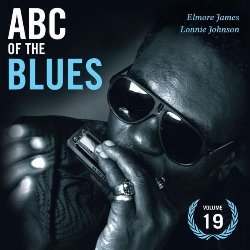ABC of the Blues CD19 (2010)
ABC Of The Blues CD19 (2010)

CD 19 – Elmore James & Lonnie Johnson 19-01 Elmore James – Dust My Broom play 19-02 Elmore James – Sho’ Nuff I Do 19-03 Elmore James – Please Find My Baby 19-04 Elmore James – Cry for Me Baby 19-05 Elmore James – Sunny Land 19-06 Elmore James – The 12 Year Old Boy 19-07 Elmore James – It Hurts Me, Too 19-08 Elmore James – Hawaiian Boogie 19-09 Elmore James – T.V. Mama 19-10 Lonnie Johnson – Have to Change Keys (To Play These Blues) 19-11 Lonnie Johnson – Mr. Johnson’s Blues play 19-12 Lonnie Johnson – Mean Old Bedbug Blues 19-13 Lonnie Johnson – Toothache Blues Pt. 1 19-14 Lonnie Johnson – Toothache Blues Pt. 2 19-15 Lonnie Johnson – Sweet Potato Blues 19-16 Lonnie Johnson – Guitar Blues 19-17 Lonnie Johnson – She’s Making Whoopee in Hell Tonight 19-18 Lonnie Johnson – Got the Blues for Murder Only 19-19 Lonnie Johnson – I’m Nuts About That Gal 19-20 Lonnie Johnson – Deep Blue Sea Blues
Elmore James (Elmore Brooks, Richland, Mississippi, January 27, 1918 – Chicago, Illinois, May 24, 1963) was an American blues singer and guitarist. He was known as “The King of the Slide Guitar”.
James was born 50 miles north of Jackson (not to be confused with another Richland just south of Jackson). He began playing as a teen, under the names “Cleanhead” and “Joe Willie James”, alongside musicians such as the first Sonny Boy Williamson, Howlin’ Wolf, and Robert Johnson. During World War II James joined the United States Navy and was stationed in Guam.
Upon his discharge Elmore returned to central Mississippi and eventually settled in Canton. He began recording with Trumpet Records in nearby Jackson in January 1951, first as sideman to the second Sonny Boy Williamson and others, then debuting as a session leader in August with what became his signature song, “Dust My Broom”. It was a surprise R&B hit in 1952 and turned James into a star. His “I Believe” was another hit a year later. During the 1950s he recorded for the Bihari Brothers’ Flair and Modern labels, as well as for Chess Records. His backing musicians were known as the Broomdusters. In 1959 he began recording what are perhaps his best sides for Bobby Robinson’s Fire Records label. These include “The Sky Is Crying” (credited to Elmo James and His Broomdusters), “Stranger Blues”, “Look On Yonder Wall”, “Done Somebody Wrong”, and “Shake Your Moneymaker”, all of which are among the most famous of blues recordings.
Alonzo "Lonnie" Johnson (February 8, 1899 – June 16, 1970) was an American blues and jazz singer/guitarist and songwriter who pioneered the role of jazz guitar and is recognized as the first to play single-string guitar solos. Johnson was not only one of the few black blues musicians invited to be 'guest featured' on a number of jazz recording sessions, he was also one of the only classic 1920's blues artists to have a revived a high-charting career after WWII.
Lonnie Johnson's early recordings are the first guitar recordings that display a single-note soloing style with use of string bending and vibrato. While it cannot be proven that this contains the influence of earlier players who did not record, it is the origin of Blues and Rock solo guitar. Johnson's influence is obvious in Django Reinhardt, T-Bone Walker and virtually all electric blues guitar players.
One of Elvis Presley's earliest recordings was Johnson's blues ballad, "Tomorrow Night" written by Sam Coslow and Will Grosz, which was also recorded by LaVern Baker. In 1957, it was also recorded by Jerry Lee Lewis.
In the liner notes for Biograph, Dylan describes his encounters with Johnson in New York City. "I was lucky to meet Lonnie Johnson at the same club I was working and I must say he greatly influenced me. You can hear it in that first record. I mean Corrina, Corrina...that's pretty much Lonnie Johnson. I used to watch him every chance I got and sometimes he'd let me play with him. I think he and Tampa Red and of course Scrapper Blackwell, that's my favorite style of guitar playing." Also, Bob Dylan wrote about the performing method he learned from Robert Johnson in Chronicles, Vol. 1. Dylan thinks Robert Johnson had learned a lot from Lonnie. Also some of Robert's songs are seen as new versions of songs recorded by Lonnie.
download (mp3 @320 kbs):
yandex 4shared mediafire ulozto gett bayfiles
Last Updated (Sunday, 25 August 2019 19:37)








